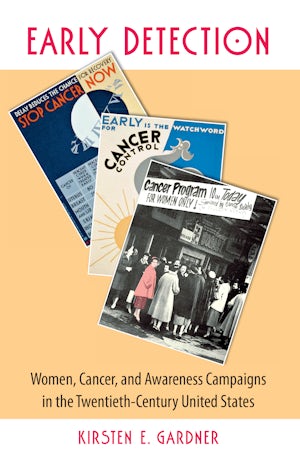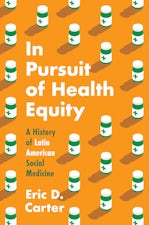Early Detection
Women, Cancer, and Awareness Campaigns in the Twentieth-Century United States
By Kirsten E. Gardner
304 pp., 5.5 x 8.5, 13 illus., 3 figs., notes, bibl., index
-
Paperback ISBN: 978-0-8078-5682-6
Published: May 2006 -
E-book EPUB ISBN: 978-0-8078-7712-8
Published: December 2006 -
E-book PDF ISBN: 979-8-8908-7837-3
Published: December 2006
Buy this Book
- Paperback $37.50
- E-Book $25.99
For Professors:
Free E-Exam Copies
By the 1930s there were 300,000 members of the Women's Field Army working together with women's clubs. They held explicit discussions about the risks, detection, and incidence of cancer and, by mid-century, were offering advice about routine breast self-exams and annual Pap smears. The feminist health movement of the 1970s, Gardner explains, heralded a departure for female involvement in women's health activism. As before, women encouraged early detection, but they simultaneously demanded increased attention to gender and medical research, patient experiences, and causal factors. Our understanding of today's vibrant feminist health movement is enriched by Gardner's work recognizing women's roles in grassroots educational programs throughout the twentieth century and their creation of supportive networks that endure today.
About the Author
Kirsten E. Gardner is assistant professor of history and women's studies at the University of Texas at San Antonio.
For more information about Kirsten E. Gardner, visit
the
Author
Page.
Reviews
"Sensitive . . . [an] excellent and innovative study."--Register of the Kentucky Historical Society
"This solid, focused book merits reading."--Social History of Medicine
"Weaves a rich tapestry documenting the remarkable efforts of women themselves, acting through twentieth-century social and professional networks, to disseminate scientific knowledge about the diagnosis . . . and treatment options for the major types of reproductive cancer afflicting women. . . . Makes a notable contribution to the history of women and health, health education, as well as the history of cancer and disease."--Journal of the History of Medicine
"Gardner's book adds an important new dimension to our understanding of the history of cancer in the United States. . . . By challenging dominant paradigms, by asking and answering difficult questions, Gardner recovers perspectives and voices that help us better understand the past, the present, and the future of cancer care in the United States. Serious students of women's history and the history of medicine need to read this book."--Journal of American History
"Gardner is thoughtful, fair, and convincing. This book is the place to start for an understanding of the origins of the modern women's health advocacy movement."--American Historical Review
"A well-written piece of high quality historical scholarship which addresses a multitude of readers."--Women's History Magazine




